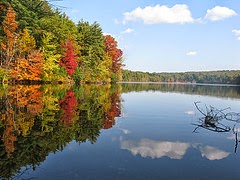 |
| The Real Walden Pond Source: Kristen Waerstad |
It's safe to say that Henry David Thoreau was a minimalist, long before it was modernly popular. He was revolutionary in his strategy for simple living.
Walden was one of the influential books in my journey to simple living. In the book, Thoreau documents the adventure of inexpensively building himself a small cabin on Walden Pond, with very little money, and using mostly used materials. His objective was to fully understand the art of living.
"...and see if I could not learn what it had to teach, and not, when I came to die, discover that I had not lived."
To spend 80 years on this planet, and still not figure out life, is a shame. Life is a process of discovery. It takes hard work and determination. There would be no worse feeling than regret at the end of your life. To reach the end and find out that you had not lived, that is a profound tragedy.
 |
| A replica of Thoreau's small cabin on Walden Pond. Source: Miguel Vieira |
"My days were not days of the week, bearing the stamp of heathen deity, nor were they minced into hours and fretted by the ticking of the clock; for I lived like the Puri Indians, of whom it is said that 'for yesterday, for today, and tomorrow they have only one word, and they express the variety of the meaning by pointing backwards for yesterday forward for tomorrow, and overhead for the passing day.'"
Clocks, calendars, and ages only remind us that we are on a one way train, with no stops along the way. How relaxing would it be to judge time by the seasons, by the sun and the stars, or by the turning yellow heads of sunflowers. To wake up with the sun and fall asleep with the stars. To not have this constant nagging sense of time and of being late.
I don't know about you, but very rarely do I not feel the affects of time. Even if I do not have an engagement for several hours, the weight of that coming timeliness, paralyses me into a state of tension.
How many days have you experienced, where you were free to do as you please, to go for a morning walk, to watch the sunset, to read a book in the sun? It is a very rare occasion indeed.
Structure is good, and humans need some element of structure, on a psychological level, otherwise we would be prone to inaction. Thoreau was obviously a self directed man. He took time to enjoy himself, but also farmed for sustenance, and improved his accommodations. He saw no disconnection between the work of living and enjoyment.
"I had this advantage, at least, in my mode of life, over those who were obliged to look abroad for amusement, to society and the theatre, that my life itself was become my amusement and never ceased to be novel."
Israel's King Solomon, the wealthiest man in history, tried everything in a quest to find the secrets of life and happiness. At the end of his search, he came to a similar conclusion as Thoreau, that joy in one's work is the highest earthly endeavor.
"This is what I have observed to be good: that it is appropriate for a person to eat, to drink and to find satisfaction in their toilsome labor under the sun during the few days of life God has given them—for this is their lot." (Ecc. 5:18)
I believe that it is important to find satisfaction in the actual work itself, and not only the outcome. If you spend three years of your life building an amazing building, that lasts for generations, but do not enjoy the process, what good will recognition do you in the grave? We have a strange obsession with leaving something behind of value, but will it really matter when your body is six feet under?
Time is of the highest value. It is your most valuable asset. It is a divine duty to figure out how to spend it. Maybe it's worth living a spartan existence on a pond, on a quest to figure it out.
Interestingly, Thoreau warns of other following his path. The point is to figure out for yourself, the best way to live, not blindly follow another.
"I would not have any one adopt my mode of living on any account; for, beside that before he has fairly learned it I may have found out another for myself, I desire that there may be as many different persons in the world as possible; but I would have each one be very careful to find out and pursue his own way, and not his father's or his mother's or his neighbor's instead."
What will be your grand adventure?
No comments:
Post a Comment